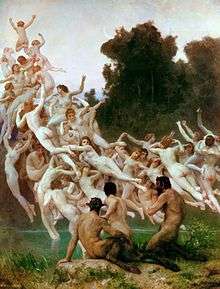Oread
For other uses, see Oread (disambiguation).

Les Oréades (1902) by William-Adolphe Bouguereau, in Musée d'Orsay
| Greek deities series |
|---|
| Nymphs |
In Greek mythology, an Oread /ˈɔːriˌæd/ or /ˈɔːri.əd/ (Ancient Greek: Ὀρειάς stem Ὀρειάδ- Oreas/Oread-, from ὄρος, "mountain") or Orestiad /ɔːˈrɛstiˌæd/ or /ɔːˈrɛsti.əd/ (Όρεστιάδες, Orestiades) is a mountain nymph. They differ from each other according to their dwelling: the Idaeae were from Mount Ida, Peliades from Mount Pelion, etc. They were associated with Artemis, since the goddess, when she went out hunting, preferred mountains and rocky precipices.
The term itself appears to be Hellenistic, first attested in Bion of Smyrna's Αδὠνιδος Επιτἀφιος and thus post-Classical.[1]
Oreads
The number of Oreads includes but is not limited to:
- Britomartis
- Claea (Mount Calathion, Messenia)[2]
- Cyllene or Kyllene (Mount Cyllene)[3]
- Daphnis (Mount Parnassos)[4]
- Echo (Mount Cithaeron)[5]
- The Idaeae (Mount Ida, Crete):[6][7]
- Nomia (Mount Nomia, Arcadia)[8]
- Othreis (Mount Othrys, Malis)[9]
- Sinoe (Mount Sinoe, Arcadia)[10]
- The Sphragitides [11] or Cithaeronides (Mount Cithaeron)[12]
References
- ↑ Henry George Liddell, Robert Scott, A Greek-English Lexicon s.v. text at Perseus project
- ↑ Pausanias, Description of Greece 3.26.11
- ↑ Bibliotheca 3.8.1
- ↑ Pausanias, Description of Greece 10.5.5
- ↑ Aristophanes, Thesmophoriazusae 970
- ↑ Bibliotheca 1.4.5
- ↑ Hyginus, Astronomica, 2.2
- ↑ Pausanias, Description of Greece 8.38.0
- ↑ Antoninus Liberalis, Metamorphoses 13
- ↑ Pausanias, Description of Greece 8.30.2
- ↑ Plutarch, Life of Aristides 11. 3
- ↑ Pausanias, Description of Greece 9.3.9
H.D. {Hilda Doolittle): poem "Oread"
This article is issued from Wikipedia - version of the 11/16/2016. The text is available under the Creative Commons Attribution/Share Alike but additional terms may apply for the media files.